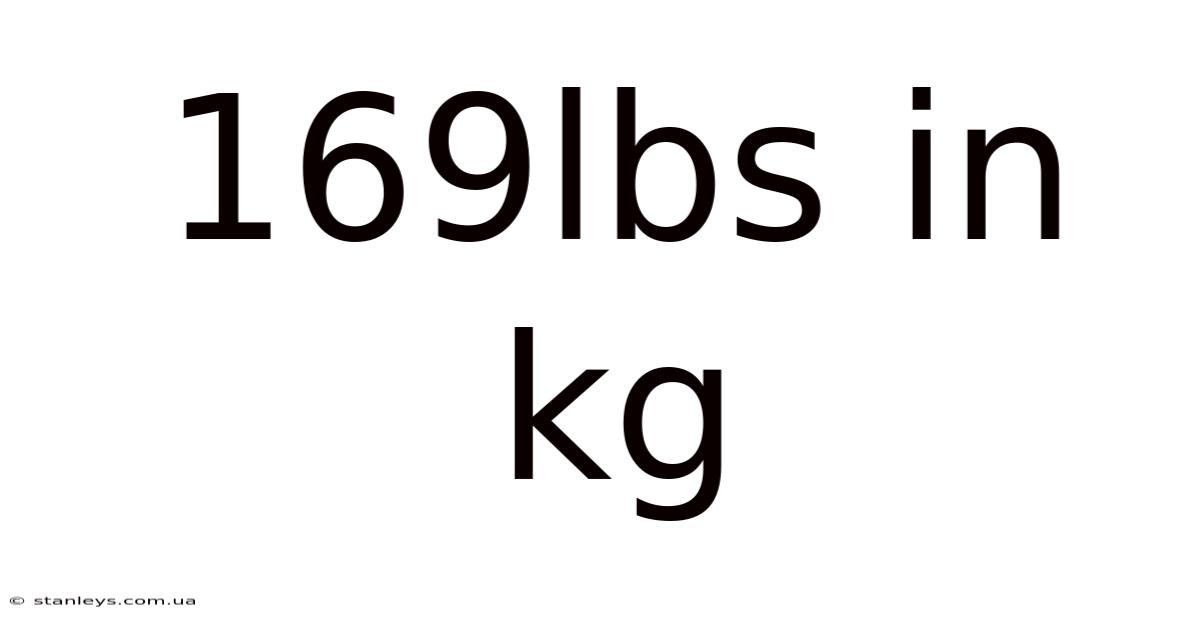169lbs In Kg
stanleys
Sep 11, 2025 · 5 min read

Table of Contents
Decoding the Weight: 169 lbs in kg and Understanding Weight Conversion
Many of us navigate the world of weights and measures daily, whether it's checking our own weight, purchasing groceries, or simply understanding international standards. The conversion between pounds (lbs) and kilograms (kg) is a common task, particularly for those interacting with international data or individuals using different measurement systems. This article delves deep into converting 169 lbs to kg, explaining the process, the underlying principles, and providing valuable context for understanding weight conversions in general. We'll also explore the significance of accurate weight measurement and address frequently asked questions.
Understanding the Conversion Factor: Pounds to Kilograms
The core of converting pounds to kilograms lies in understanding the conversion factor. One kilogram is approximately equal to 2.20462 pounds. This means that a kilogram is heavier than a pound. Therefore, when converting pounds to kilograms, you'll always get a smaller numerical value. The conversion is straightforward: you divide the weight in pounds by the conversion factor (2.20462).
Formula: Kilograms = Pounds / 2.20462
Let's apply this to our specific question: converting 169 lbs to kg.
Calculation: 169 lbs / 2.20462 lbs/kg ≈ 76.65 kg
Therefore, 169 lbs is approximately equal to 76.65 kg.
Step-by-Step Guide to Converting 169 lbs to kg
For those who prefer a more detailed, step-by-step approach, here's a breakdown of the conversion process:
- Identify the weight in pounds: We have 169 lbs.
- Find the conversion factor: The conversion factor from pounds to kilograms is approximately 2.20462. Remember this is an approximation; the actual value is slightly longer.
- Divide the weight in pounds by the conversion factor: 169 lbs / 2.20462 lbs/kg
- Calculate the result: The result of this calculation is approximately 76.65 kg.
- Round off (optional): Depending on the level of precision required, you can round off the result. For most practical purposes, rounding to two decimal places (76.65 kg) is sufficient.
The Significance of Accurate Weight Measurement
Accurate weight measurement is crucial in various aspects of life, including:
- Healthcare: Doctors use weight measurements to assess a patient's health, monitor weight changes, and calculate medication dosages. Inaccurate weight measurements can lead to misdiagnosis and inappropriate treatment.
- Nutrition: Accurate weight is vital for monitoring dietary progress, calculating caloric intake, and assessing body mass index (BMI).
- Manufacturing and Industry: Many industries rely on precise weight measurements for quality control, production processes, and shipping. Inaccurate weights can result in significant financial losses and safety hazards.
- Sports and Fitness: Athletes use weight to monitor training progress and adjust their fitness regimens. Accurate weight tracking is essential for performance optimization.
- Shipping and Logistics: Accurate weight is fundamental for calculating shipping costs and ensuring safe transportation.
Beyond the Conversion: Understanding Weight and its Units
While the conversion itself is simple, understanding the underlying units helps grasp the magnitude of the weight.
- Pounds (lbs): A unit of mass in the imperial system, commonly used in the United States and a few other countries.
- Kilograms (kg): A unit of mass in the metric system, internationally recognized and used by most of the world. The kilogram is the base unit of mass in the International System of Units (SI).
The difference between these systems reflects historical development and different standards. The metric system is generally preferred for its decimal-based structure, making conversions within the system much simpler.
Common Mistakes in Weight Conversions
While the conversion process is relatively straightforward, some common mistakes can occur:
- Using the wrong conversion factor: Using an incorrect conversion factor (e.g., inverting the value) will result in a significantly inaccurate answer.
- Rounding errors: Excessive rounding during the calculation can accumulate errors, especially when dealing with multiple conversions.
- Misinterpreting units: Failing to pay attention to the units (lbs vs. kg) can lead to confusion and inaccurate results.
Frequently Asked Questions (FAQs)
Q: Is 76.65 kg a healthy weight for everyone?
A: No, weight is relative to height, age, sex, body composition, and overall health. A weight of 76.65 kg might be considered healthy for some individuals and unhealthy for others. BMI (Body Mass Index) calculations incorporate height to provide a more relevant assessment of weight relative to body size. Consulting a healthcare professional is crucial for determining a healthy weight range for an individual.
Q: How accurate is the conversion of 169 lbs to 76.65 kg?
A: The conversion is highly accurate, given the commonly used conversion factor of 2.20462. The slight variations you might find in different calculators stem from using different levels of precision in the conversion factor.
Q: What other units of weight are commonly used?
A: Besides pounds and kilograms, other common units include ounces (oz), grams (g), stones (st), and tonnes (t).
Q: Can I convert other weights using this method?
A: Yes, absolutely. You can use the same formula (Pounds / 2.20462) to convert any weight in pounds to kilograms.
Conclusion: Mastering Weight Conversions
Converting 169 lbs to kg, while seemingly a simple task, highlights the importance of understanding unit conversions and their practical applications. Accurate weight measurement plays a significant role in various aspects of life, from healthcare to industry. By understanding the process, potential errors, and the significance of accurate measurements, we can confidently navigate the world of weights and measures with greater precision and understanding. Remember always to double-check your calculations and consult relevant resources for specific applications requiring highly accurate weight conversions. This understanding extends far beyond a simple numerical calculation; it represents a fundamental element in data interpretation and practical problem-solving.
Latest Posts
Related Post
Thank you for visiting our website which covers about 169lbs In Kg . We hope the information provided has been useful to you. Feel free to contact us if you have any questions or need further assistance. See you next time and don't miss to bookmark.